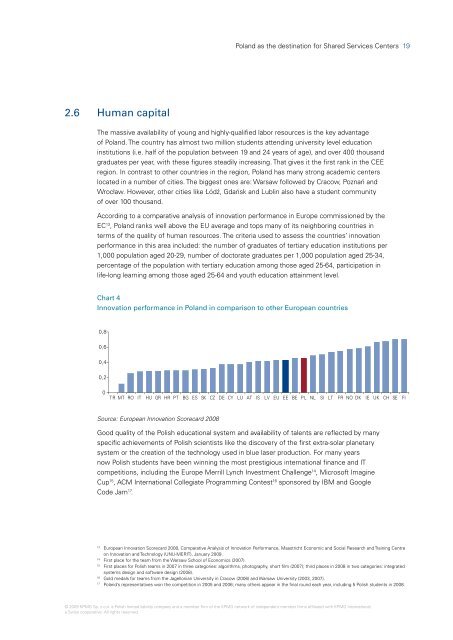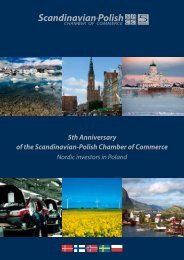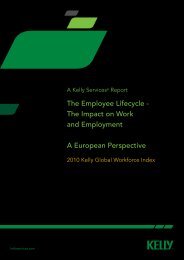Poland as the destination for Shared Services Centers
Poland as the destination for Shared Services Centers
Poland as the destination for Shared Services Centers
Create successful ePaper yourself
Turn your PDF publications into a flip-book with our unique Google optimized e-Paper software.
2 .6 Human capital<br />
<strong>Poland</strong> <strong>as</strong> <strong>the</strong> <strong>destination</strong> <strong>for</strong> <strong>Shared</strong> <strong>Services</strong> <strong>Centers</strong> 19<br />
The m<strong>as</strong>sive availability of young and highly-qualified labor resources is <strong>the</strong> key advantage<br />
of <strong>Poland</strong>. The country h<strong>as</strong> almost two million students attending university level education<br />
institutions (i.e. half of <strong>the</strong> population between 19 and 24 years of age), and over 400 thousand<br />
graduates per year, with <strong>the</strong>se figures steadily incre<strong>as</strong>ing. That gives it <strong>the</strong> first rank in <strong>the</strong> CEE<br />
region. In contr<strong>as</strong>t to o<strong>the</strong>r countries in <strong>the</strong> region, <strong>Poland</strong> h<strong>as</strong> many strong academic centers<br />
located in a number of cities. The biggest ones are: Warsaw followed by Cracow, Poznań and<br />
Wrocław. However, o<strong>the</strong>r cities like Łódź, Gdańsk and Lublin also have a student community<br />
of over 100 thousand.<br />
According to a comparative analysis of innovation per<strong>for</strong>mance in Europe commissioned by <strong>the</strong><br />
EC 13 , <strong>Poland</strong> ranks well above <strong>the</strong> EU average and tops many of its neighboring countries in<br />
terms of <strong>the</strong> quality of human resources. The criteria used to <strong>as</strong>sess <strong>the</strong> countries’ innovation<br />
per<strong>for</strong>mance in this area included: <strong>the</strong> number of graduates of tertiary education institutions per<br />
1,000 population aged 20-29, number of doctorate graduates per 1,000 population aged 25-34,<br />
percentage of <strong>the</strong> population with tertiary education among those aged 25-64, participation in<br />
life-long learning among those aged 25-64 and youth education attainment level.<br />
Chart 4<br />
Innovation per<strong>for</strong>mance in <strong>Poland</strong> in comparison to o<strong>the</strong>r European countries<br />
0,8<br />
0,6<br />
0,4<br />
0,2<br />
0<br />
TR MT RO IT HU GR HR PT BG ES SK CZ DE CY LU AT IS LV EU EE BE PL NL SI LT FR NO DK IE UK CH SE FI<br />
Source: European Innovation Scorecard 2008<br />
Good quality of <strong>the</strong> Polish educational system and availability of talents are reflected by many<br />
specific achievements of Polish scientists like <strong>the</strong> discovery of <strong>the</strong> first extra-solar planetary<br />
system or <strong>the</strong> creation of <strong>the</strong> technology used in blue l<strong>as</strong>er production. For many years<br />
now Polish students have been winning <strong>the</strong> most prestigious international finance and IT<br />
competitions, including <strong>the</strong> Europe Merrill Lynch Investment Challenge 14 , Microsoft Imagine<br />
Cup 15 , ACM International Collegiate Programming Contest 16 sponsored by IBM and Google<br />
Code Jam 17 .<br />
13 European Innovation Scorecard 2008, Comparative Analysis of Innovation Per<strong>for</strong>mance, Ma<strong>as</strong>tricht Economic and Social Research and Training Centre<br />
on Innovation and Technology (UNU-MERIT), January 2009.<br />
14 First place <strong>for</strong> <strong>the</strong> team from <strong>the</strong> Warsaw School of Economics (2007).<br />
15 First places <strong>for</strong> Polish teams in 2007 in three categories: algorithms, photography, short film (2007); third places in 2008 in two categories: integrated<br />
systems design and software design (2008).<br />
16 Gold medals <strong>for</strong> teams from <strong>the</strong> Jagellonian University in Cracow (2006) and Warsaw University (2003, 2007).<br />
17 <strong>Poland</strong>’s representatives won <strong>the</strong> competition in 2005 and 2006; many o<strong>the</strong>rs appear in <strong>the</strong> final round each year, including 5 Polish students in 2008.<br />
© 2009 KPMG Sp. z o.o. a Polish limited liability company and a member firm of <strong>the</strong> KPMG network of independent member firms affiliated with KPMG International,<br />
a Swiss cooperative. All rights reserved.










